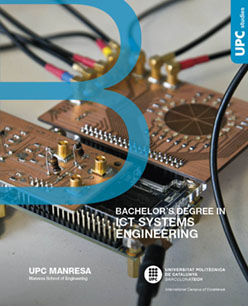
Bachelor's degree in ICT Systems Engineering
Manresa School of Engineering (EPSEM)
The bachelor’s degree in ICT Systems Engineering trains and qualifies you to deal with engineering problems in which electronics, informatics and communications play a part. You will have a general training profile and the specific knowledge required to work in the emerging, high-impact sector of embedded systems, which are present in automobiles, home automation, industrial machinery, medical equipment, consumer electronics and traffic control systems.
- Duration
- 4 academic years
- Study load
- 240 ECTS credits (including the bachelor's thesis). One credit is equivalent to a study load of 25-30 hours.
- Delivery
- Face-to-face
- Admission mark 2025-2026 academic year
- 7,538
- Language of instruction
Check the language of instruction for each subject (and timetable) in the course sheet in the curriculum.
Information on language use in the classroom and students’ language rights.
- Fees and grants
- Approximate fees per academic year: €1,061 (€1,800 for non-EU residents ). Consult the public fees system based on income (grants and payment options).
- Location
- Manresa School of Engineering (EPSEM)
- Official degree
- Recorded in the Ministry of Science, Innovation and Universities
- Places
- 44
- Pre-enrolment code
- 31065
- Places via a change of degree
- 4
- Admission mark 2025-2026 academic year
- 7,538. Admission mark
- Weighting. University entrance examinations (PAU)
- Weighting. University entrance examinations (PAU)
- Registration and enrolment
- What are the requirements to enrol in a bachelor's degree course?
- CFGS credit transfer
- Consult the university studies search engine of the Universities Channel of the Generalitat de Catalunya
- Legalisation of foreign documents
- All documents issued in non-EU countries must be legalised and bear the corresponding apostille.
First semester
Second semester
Third semester
Fourth semester
Fifth semester
Sixth semester
- Electronic Control Systems 6
- Embedded Systems 6
- Internet Applications and Services 6
- Systems Engineering 6
- Bioengineering 6
- Chemistry 6
- Data Transmission 6
- Databases 6
- Decision Optimisation and Theory 6
- Digital Audio and Video 6
- Energy Resources 6
- Graphic Expression 6
- Innovation, People Management and Business Start-Up 6
- Materials Science and Technology 6
- Mechanical Systems 6
- Strength of Materials 6
- User Interfaces 6
- Wind and Solar Power Generation 6
Seventh semester
Eighth semester
- Bachelor's Thesis 24
- CompulsoryECTS
- OptionalECTS
- ProjectECTS
- Professional opportunities
- Design, specification and implementation of widgets and systems that require knowledge of electronics, informatics and communications.
- ICT companies or companies for which ICTs may provide added value.
- Businesses and institutions that develop products or provide services in which electronics, informatics and communications play a part, such as the automobile industry; companies that develop manufacturing machinery and testing and laboratory equipment; biomedical, electronics, home automation and environmental industries; and the control systems industry.
- Engineering firms that carry out interdisciplinary projects.
- Project management in ICT companies.
- R&D design engineering.
- R&D project management.
- Product management.
- Technical, sales and management positions.
Check the degree’s main quality indicators in the University Studies in Catalonia portal of the Catalan University Quality Assurance Agency. Find information on topics such as degree evaluation results, student satisfaction and graduate employment data.
- Academic calendar
- General academic calendar for bachelor’s, master’s and doctoral degrees courses
- Academic regulations
- Academic regulations for bachelor’s degree courses at the Universitat Politècnica de Catalunya (UPC).
- Language certification and credit recognition
- Queries about language courses and certification
- 18/02/2026 10:00 hface-to-face
- 18/04/2026 10:00 hface-to-face
- 09/05/2026 10:00 hface-to-face
- 17/06/2026 18:00 hvirtual
Download brochure

Open day
Bachelor's degree in ICT Systems Engineering
- Day
- 18/02/2026
- Time
- 10:00 h
- Location
- Escola Politècnica Superior d'Enginyeria de Manresa (EPSEM)
- Manresa
- Contact details
- comunicacio.epsem@upc.edu
- More information
- Face-to-face information session. Registration
Open day
Bachelor's degree in ICT Systems Engineering
- Day
- 18/04/2026
- Time
- 10:00 h
- Location
- Escola Politècnica Superior d'Enginyeria de Manresa (EPSEM)
- Manresa
- More information
- Face-to-face information session. Registration
Open day
Bachelor's degree in ICT Systems Engineering
- Day
- 09/05/2026
- Time
- 10:00 h
- Location
- Escola Politècnica Superior d'Enginyeria de Manresa (EPSEM)
- Manresa
- More information
- Face-to-face information session. Registration
Open day
Bachelor's degree in ICT Systems Engineering
- Day
- 17/06/2026
- Time
- 18:00 h
- More information
- Virtual information session. Registration


